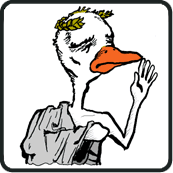4. FIND REFERENCES TO GREEK MYTHOLOGY IN EVERYDAY LIFE
Yes, yes, these stories are all interesting, but they also maintain a strong influence on today's culture. Here are a couple of interesting examples:
- Oedipus complex: Sigmund Freud believed that all men want to kill their fathers so that they can marry their mothers. So today, whenever we see a guy who is just a bit too close to his mom, we might say that he has an Oedipal complex.
The term originated from this Greek story: there was this guy named Oedipus who, at birth, was destined by fate to kill his father (who also happened to be the King of Thebes) and marry his mother. The people in Thebes thought that this was a pretty big deal, so when Oedipus was an infant, he was sent away. As an adult, Oedipus returns to Thebes only to - you guessed it - kill his dad and marry his mom.
By the way, the reverse condition (women who seek to kill their mother and marry their father) is called the Elektra complex. - Achilles' heel: Achilles was born to a goddess mother, Thetis, and a human father, Peleus. Thetis did not like the fact that her son was part mortal, so she was told to dip him into the River Styx to cleanse him of his mortality and render him invincible. She did this, but held him by his heel as she dipped. His heel was left untouched by the water, and so that remained the only part of him that was not invincible. Years later when he was in battle in the Trojan War, Achilles' enemies took advantage of his weak spot and shot a poisonous arrow directly into his heel, and he died.
We now use this term to refer to someone's weakest spot, the cause of his or her downfall. For instance, if ice cream is your Achilles' heel, then the one way someone can get you to do something for him or her is to offer you ice cream. - A Herculean task: Hercules is actually the Roman name of the Greek hero, Heracles. Heracles is famous for his unbelievable strength. Throughout his life, Heracles was also challenged to many physical tasks (such as defeating the many-headed Hydra). Each and every time, Heracles successfully accomplished his "labors," all because of his god-like strength. Today, we use the term "Herculean task" to refer to a challenge that is so difficult, that only Heracles, with his god-like strength, could accomplish it. It doesn't mean that something is impossible, but it means that it's overwhelmingly large and should require more than one person.
- Pandora's Box: Pandora was the first woman, and she had a good relationship with the gods. One day, the god Epimetheus told Pandora not to open a certain box. She opened the box anyway, and pain, war, illness, and all of the other evils of the world poured out. The only thing left in the box was hope.
When people today speak of opening a Pandora's Box, they mean that even a small, well-intentioned action can release a flood of negative repercussions.
Greek mythology also has a strong presence in pop culture. For instance:
- The Muse - This 1999 movie depicted Sharon Stone as an inspiration for a filmmaker who had lost his creative steam. Now you know that this title came from the characters in Greek mythology that inspired artists.
- Sirens - This Hugh Grant and Elle MacPherson film takes place in the late 1920s, and tells the story of an artist on an island whose work and lifestyle are observed by a visiting bishop. The artist's lifestyle included having many female "friends" around who inspire his work. You now understand that the title of this movie is not incidental; the sirens were gorgeous creatures that lured men to their deaths with their beautiful siren songs.
- A Midsummer Night's Dream - This movie, starring Calista Flockhart (whose name in Greek means "good"), Kevin Kline, and Michelle Pfeiffer, is based on Willy Shakespeare's play. In it, nymphs and other magical spirits contribute to the air of confusion, silliness, and falling in love with the wrong partner. You are now a bit wiser, for you realize that nymphs were the spritely gods of the forest who liked to play tricks on humans.
- Clash of the Titans - This movie, starring Harry Hamlin, basically retells the story of Perseus and how he encountered mythological creatures to save his girlfriend. A super-cheesy movie, but you'll get to see a bunch of actors portraying the gods.
While you're not exactly a "geek of all things Greek," you now know enough about the subject to make a few mythological references at parties. We're so proud of you.

 -->
-->